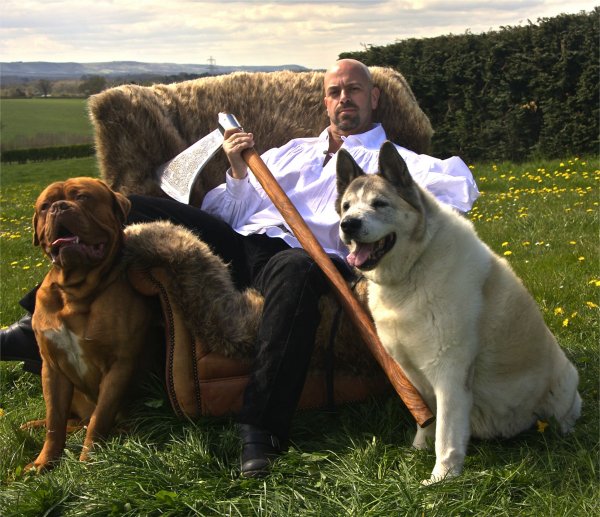 Today we have with us author John Gwynne! For those of you unfamiliar with his work, his first series, The Faithful and the Fallen, debuted in 2012 and finished in 2016, when its final book, Wrath, won our Best Fantasy Book of the Year. (The first book, Malice, also won the Gemmell Morningstar Award.) His second series, Of Blood and Bone, came out last year, with the second book, A Time of Blood, released earlier this year.
Today we have with us author John Gwynne! For those of you unfamiliar with his work, his first series, The Faithful and the Fallen, debuted in 2012 and finished in 2016, when its final book, Wrath, won our Best Fantasy Book of the Year. (The first book, Malice, also won the Gemmell Morningstar Award.) His second series, Of Blood and Bone, came out last year, with the second book, A Time of Blood, released earlier this year.
When not writing, he can be found fixing furniture, training for battle with spear, sword and shield on the South Downs, dressed in a coat of mail, or standing in a shieldwall. He also has an amazing author photo.
Welcome back to Fantasy-Faction. Let’s start with something simple. How does it feel to be so often compared to the legend David Gemmell? Who are some of your other influences as a writer?
Hi Rakib, it’s great to be here, and thank you for the invite.
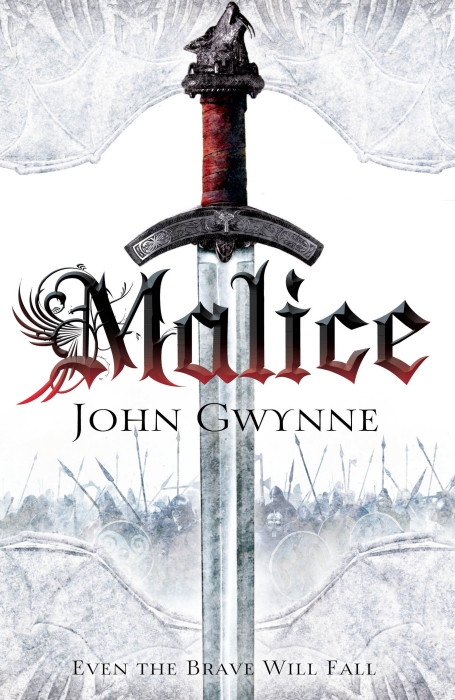 Compared to
David Gemmell—ha, that just sounds crazy. Gemmell was someone I read
voraciously and is one of my favourite all-time authors, so to be compared to
him, well, it’s a pinch-me moment every time, and I have to confess it does
feel…amazing. 🙂 It’s a fast-track to instant grin. David Gemmell is
responsible for stealing many, many hours of my life—Legend was the very
first book I stayed up through the night to finish, because Gemmell had
mastered that rare ‘just one more page’ skill. As I’ve said many times, I’m a
huge fan of him—Sword in the Storm is still one of my all-time favourite
reads. I loved Gemmell’s flawed hero’s and fast pacing. So, to be compared to him
in any way is a big deal to me.
Compared to
David Gemmell—ha, that just sounds crazy. Gemmell was someone I read
voraciously and is one of my favourite all-time authors, so to be compared to
him, well, it’s a pinch-me moment every time, and I have to confess it does
feel…amazing. 🙂 It’s a fast-track to instant grin. David Gemmell is
responsible for stealing many, many hours of my life—Legend was the very
first book I stayed up through the night to finish, because Gemmell had
mastered that rare ‘just one more page’ skill. As I’ve said many times, I’m a
huge fan of him—Sword in the Storm is still one of my all-time favourite
reads. I loved Gemmell’s flawed hero’s and fast pacing. So, to be compared to him
in any way is a big deal to me.
Other influences—Tolkien, obviously; I think it’s pretty hard for any fantasy writer to not have been influenced in some way by Tolkien.
The other writer who has been a great inspiration to me is Bernard Cornwell. I know he writes mostly historical novels, but there is a strong relationship between fantasy and history, so for me many of Cornwell’s novels are only a step away from fantasy. His series on King Arthur is one of my favourite series of all time. Like Gemmell, it comes back to the characters. I love Cornwell’s ability to write real, relatable characters and combine them with bone-crunching action and intricate plots.
It’s been only a few months since A Time of Blood, the second book in your Of Blood and Bone series, was released, so it is it too early to ask about when will we get the third one. Is the third one going to end the series like you mentioned before or can we readers hope to get more out of these characters?
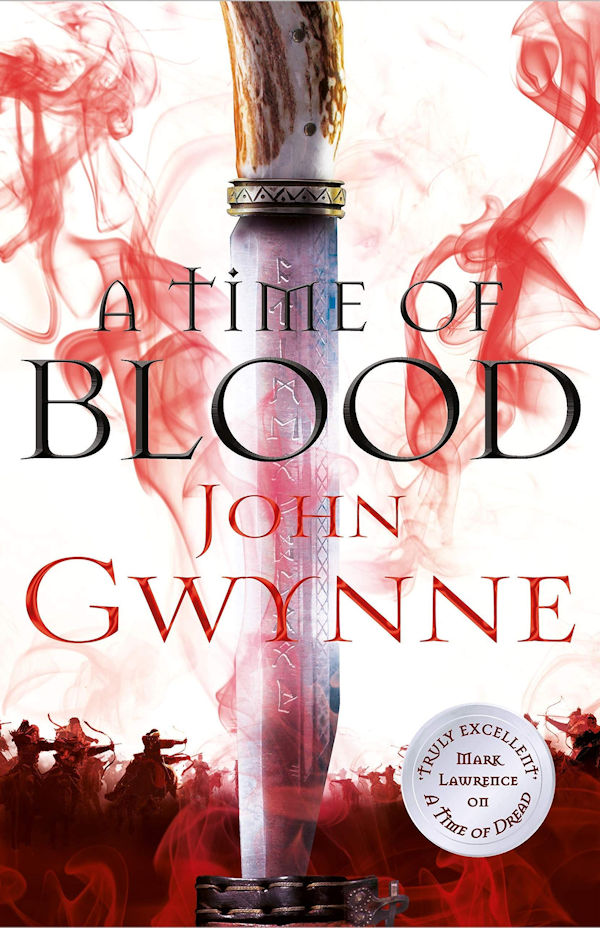 Actually,
things are all well on schedule, so I can give you some information about the
publication timetable. Book three, A Time of Courage, is written and
been through the main edit and the copyedit, so it’s pretty much done. It’s due
to be published in April 2020. This is definitely the end of the series, and of
my time in the Banished Lands, for the moment, so there is nothing planned with
any of the characters from Of Blood and Bone.
Actually,
things are all well on schedule, so I can give you some information about the
publication timetable. Book three, A Time of Courage, is written and
been through the main edit and the copyedit, so it’s pretty much done. It’s due
to be published in April 2020. This is definitely the end of the series, and of
my time in the Banished Lands, for the moment, so there is nothing planned with
any of the characters from Of Blood and Bone.
Although I have thought about the possibility of some short stories involving characters from Of Blood and Bone—the ones that survive A Time of Courage, at least.
Speaking of characters, how does it feel writing about Drem, Riv and company? Who among these characters is your favorite to write about? And can we expect more viewpoint characters in the future?
I’ve loved writing the new characters in the Of Blood and Bone series. Riv, Drem and Bleda have taken up a large part of my life for the last three or four years, so writing this final book has been quite the journey for me. I hope that you find their story in A Time of Courage to be an emotional and satisfying conclusion to the tale. It’s hard to pick a favourite—I think Bleda really comes into his own in this last instalment, I certainly enjoyed writing his thread a lot. My favourite, though…well, Drem is inspired by my youngest son, who happens to be on the autistic spectrum, so if I had to choose it would be Drem.
And yes, you can expect another viewpoint character in A Time of Courage. It is Jin, who you’ve already met as a supporting character in A Time of Dread and A Time of Blood. Jin is Bleda’s one-time betrothed, and now his most hated enemy. I like to tell a story from both sides of the conflict, so Jin feels like the perfect pair of eyes to tell part of this story from.
You, as a writer, are acclaimed for your fighting scenes. Care to divulge a bit about what your method of getting to depict action so brilliantly? Do you research much for your writing?
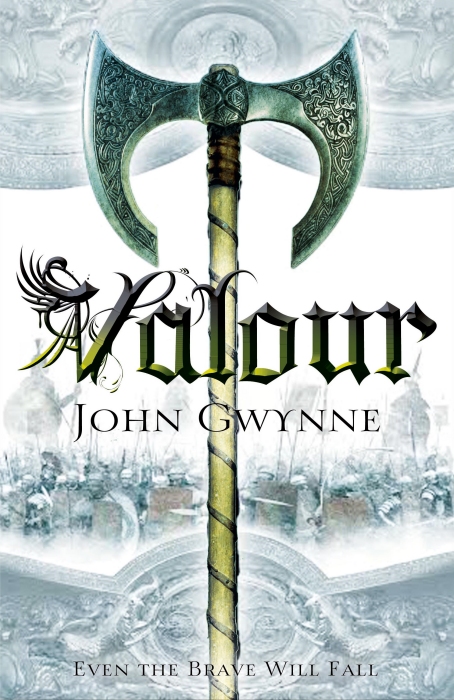 Thank you,
that’s very kind of you to say. I write my action scenes the same as everything
else—by trying to keep it grounded in the characters, seeing things through
their eyes, with their own unique personalities and filters. I try and keep the
combat authentic and realistic—I’m writing fantasy, but I aim for authenticity
within that. I love mythology and history, so have spent a lot of time reading
about ancient cultures, and much of that includes their military capabilities.
I suppose I’ve soaked up a lot of information over the years. 🙂 I’m also a
keen Viking re-enactor, so have stood in the shield wall a few times—with my
sons on either side of me, which is an amazing feeling. I think all of that
colours my writing.
Thank you,
that’s very kind of you to say. I write my action scenes the same as everything
else—by trying to keep it grounded in the characters, seeing things through
their eyes, with their own unique personalities and filters. I try and keep the
combat authentic and realistic—I’m writing fantasy, but I aim for authenticity
within that. I love mythology and history, so have spent a lot of time reading
about ancient cultures, and much of that includes their military capabilities.
I suppose I’ve soaked up a lot of information over the years. 🙂 I’m also a
keen Viking re-enactor, so have stood in the shield wall a few times—with my
sons on either side of me, which is an amazing feeling. I think all of that
colours my writing.
I do a lot of research for my writing. At the moment I’m working on a new series set in a new world—it’s about monster-hunting mercenary bands, with the initial inspiration being Beowulf and Ragnarok—I thought, what would have happened after Ragnarok.
The research for this series has included Beowulf, the Volsung Saga, Norse mythology, the Icelandic Sagas, the Havamal, the Prose and Poetic Edda, Scandinavian history and folklore, Icelandic magic, Viking history, culture, weapons, warfare, boat building, and so much more. Most of it will never appear in the book, but research is like an iceberg, you only see the tip above the water, but there is a whole load of other information that has contributed to getting the book to float.
I know you have had various professions before becoming a full-time writer. What would you say was your favorite among them? Do you ever think of doing anything other than writing as a profession now-a-days?
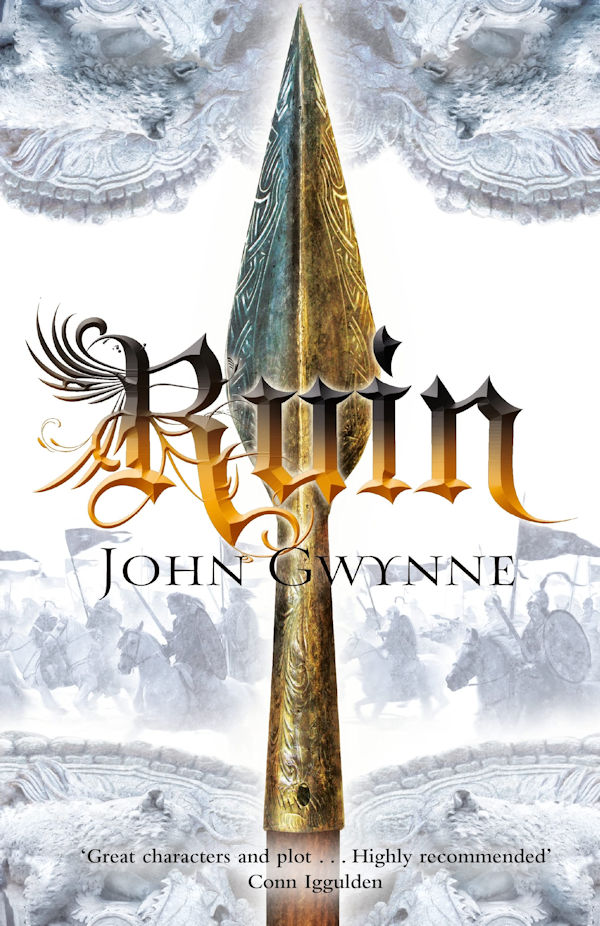 I have had
a few jobs through the years, some I’ve enjoyed and others I haven’t (I think
packing soap in a soap factory for eight hours a day ranks as my least favourite
job), but writing is my absolute favourite—I love writing, and even though
there are times when I have to be disciplined, it never really feels like
work. Playing double bass in a rock ‘n’ roll band was a lot of fun, too, but
that’s a young man’s game. Life on the road, living in a van off of pot-noodle,
and those bass amps are heavy.
I have had
a few jobs through the years, some I’ve enjoyed and others I haven’t (I think
packing soap in a soap factory for eight hours a day ranks as my least favourite
job), but writing is my absolute favourite—I love writing, and even though
there are times when I have to be disciplined, it never really feels like
work. Playing double bass in a rock ‘n’ roll band was a lot of fun, too, but
that’s a young man’s game. Life on the road, living in a van off of pot-noodle,
and those bass amps are heavy.
Are you a huge rock/metal fan? What bands and artists do you usually listen to when you write?
I like all kinds of music, but my first love is vintage roots music—blues, rockabilly, jazz, and that’s what I liked to play. I don’t listen to that when I’m writing. For writing I listen to music that can help transport me to the Banished Lands, or the Shattered Realms (the world of my new series). Soundtracks are great for that—Lord of the Rings, Gladiator, Last of the Mohicans, and a lot of other stuff. I love the soundtrack from Francis Ford Coppola’s Dracula. I make playlists that set a tone for me—one for when I’m writing battle scenes, a playlist for more sinister moments.
I also listen to this. It was written by the hugely talented Will Musser, of American Horror Story fame—he emailed me and said he’d loved reading about the Banished Lands and wanted to write some music for it. We chatted about my influences and this is what he came up with. I love it—it feels raw, emotional, gritty and epic, everything that I want my writing to be. I play it on loop. 🙂
What can your fans expect from you in the future? Would you care divulge some new info regarding your future works for us?
I’m working on a new series at the moment, a Norse-inspired fantasy trilogy that will be published in 2021 (A Time of Courage is published in April 2020, so it will be roughly a year after that). I’ve recently finished researching the new series and am now writing it. The starting point of this new series (as mentioned above) is the epic poem Beowulf, and Ragnarok from Norse mythology. Here’s some info on it I wrote for the good people at Orbit UK.
The gods are dead. The world is broken.
The old gods have fought themselves to extinction, their remains scattered across the battleground of a fractured land, where monsters roam and humans are most definitely not the apex predator.
From the ashes of this cataclysm a new world must be forged, territories carved out and ruled over by new Jarls, petty kings and queens, all hungry for power. No matter what the cost.
And there is power to be found within the remains of the gods—their bones, their weapons and jewels, and their off-spring. The half-breed children of gods and humans, gifted with powers that make them a fearsome enemy—and a desirable prize.
Mercenary bands form, hired to search out these relics, remains and god-children, competing against one another for the most powerful, seeking to sell them to the highest bidder. Power doesn’t come cheap.
I’m deeply excited about writing this new series. It is heavily Norse-inspired, based on my love of the Norse myths and Sagas and my experiences in Viking re-enactment. My love of history has helped to form this tale just as much as my love of fantasy and mythology, with much of my research focusing on Scandinavian and Viking history.
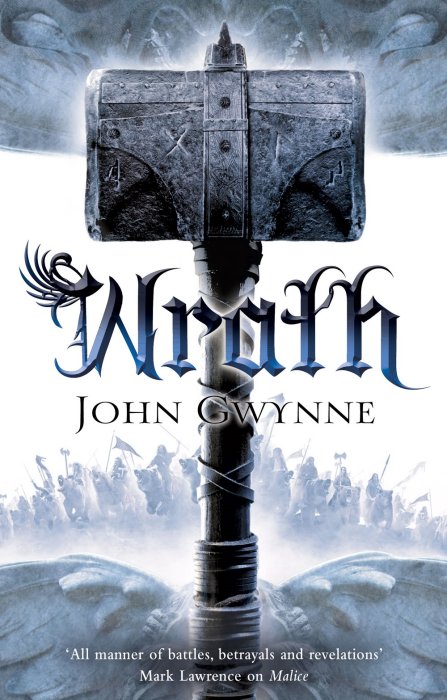 My first
inspiration for this story is Beowulf; a band of Norse monster-hunting
mercenaries—though the bands of warriors in this tale will be grittier and less
heroic than Beowulf and his heroes, because the greatest monsters do not always
fight with claw and fang. I’ve delved deep into Norse mythology and
Scandinavian folklore to build this new world; a world of ice-blue fjords, of
snow-peaked mountains and dark, mist-shrouded forests, a world where dragon-ships
prowl the seas and creatures walk the land.
My first
inspiration for this story is Beowulf; a band of Norse monster-hunting
mercenaries—though the bands of warriors in this tale will be grittier and less
heroic than Beowulf and his heroes, because the greatest monsters do not always
fight with claw and fang. I’ve delved deep into Norse mythology and
Scandinavian folklore to build this new world; a world of ice-blue fjords, of
snow-peaked mountains and dark, mist-shrouded forests, a world where dragon-ships
prowl the seas and creatures walk the land.
I hope that it will feel real and gritty, but mythical, otherworldly and terrifying as well.
But most of all this tale is built around the characters. I hope that they will be the heart of the story, and that they will carry the reader into a world of danger, of oaths and betrayal, of love and friendship. Into the world of the Bloodsworn.
I’m really excited and hope it will be something you enjoy.
Is there any other genre besides fantasy that interests you? And are you planning on writing in any other particular genres?
These days I mostly read fantasy. The other genre I read a lot of is historical—so, anything by Bernard Cornwell, Conn Iggulden, Christian Cameron, Giles Kristian. I have thought about the possibility of writing something in the historical genre, if I ever have the time and manage to get ahead of my contracted deadlines—watch this space.
Did you enjoy any genre that’s come out in 2019? Can you recommend some books/movies/comics for our readers?
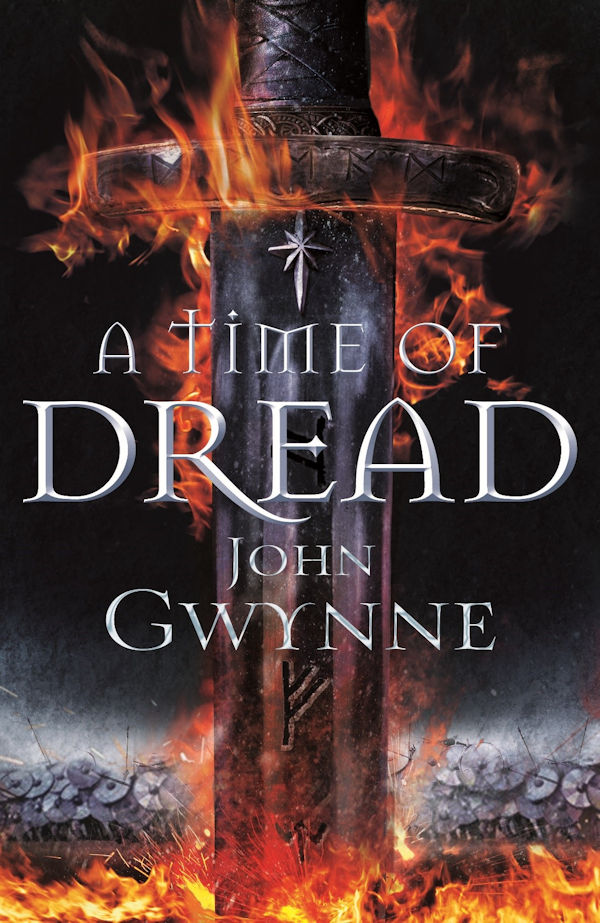 2019 has been a great year for our genre. It saw the end of two huge franchises—Avengers: Endgame and Game of Thrones. Plus, a load of great releases in books—Joe Abercrombie is back with A Little Hatred, Mark Lawrence’s Holy Sister was wonderful. Miles Cameron finishes his latest series with Bright Steel. RJ Barker’s Bone Ships was a whole lot of swashbuckling fun.
2019 has been a great year for our genre. It saw the end of two huge franchises—Avengers: Endgame and Game of Thrones. Plus, a load of great releases in books—Joe Abercrombie is back with A Little Hatred, Mark Lawrence’s Holy Sister was wonderful. Miles Cameron finishes his latest series with Bright Steel. RJ Barker’s Bone Ships was a whole lot of swashbuckling fun.
I’ve read some great debuts as well—Brian Naslund, Matthew Ward. In the world of graphic novels, I’ve recently read Monstress, and that was brilliant. At the moment I’m reading The Black Hawks by David Wragg and enjoying it immensely.
Thanks for returning to the site. As a last question, would you be kind enough to utter a few words of advice for new writers of genre fiction?
Thanks, so much for the invite, I’m a big fan of Fantasy-Faction, so it’s an absolute pleasure to be here.
Writing advice for new writers! I struggle with that, but if I had to say one thing, it would be this:
Write what you want to read. That’s what I try to do.
Thanks again to John Gwynne for stopping by to talk with us. For more information on his work you can visit his website and you can follow him on Twitter, Instagram, and Facebook.

